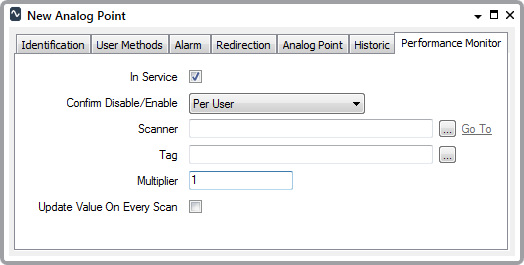Use the fields on the Performance Monitor tab to define the driver-specific properties of an analog point. For information on those fields that are common to points on many simple drivers, see Configure Common Point Properties in the Geo SCADA Expert Guide to Simple Drivers. Fields that are specific to analog points on the Performance Monitor driver are described below.

- Tag—Use to specify the particular aspect of system performance that this analog point is to represent within Geo SCADA Expert. Select the browse button to display a Reference browse window, and select the required attribute from the window.
Use the properties on the various tabs of the Analog Point Form to define how the performance data is to be managed within Geo SCADA Expert.
- Multiplier—Use this field to specify what calculation the driver is to perform on the raw performance value, for use within Geo SCADA Expert.
Leave the value at the default of 1 if the raw value is to be used within Geo SCADA Expert without further processing.
Example:
A Performance Monitor Analog Point is configured to monitor a server’s Memory Usage. The Memory Usage is in bytes on the server. This is to be represented in kilobytes within Geo SCADA Expert, therefore a Multiplier of 0.0009765625 (the decimal equivalent of 1/1024) is used to convert the raw value from bytes to kilobytes.
- Update Value on Every Scan—Use this check box to specify whether the scanner is to update the value of this point in Geo SCADA Expert every time the point’s source is scanned, regardless of whether the value has changed.
Select the check box if the value of the point is to be updated whenever its source is scanned. Select the check box if, for example, the point’s value is to trigger Logic program(s) whenever a scan occurs, or if the point value rarely changes and you want Geo SCADA Expert to use a recently retrieved value.
Clear the check box if the value of the point is only to be updated in Geo SCADA Expert if its value has changed from the last recorded value. A point that is associated with an attribute that regularly changes, for example, need only be updated if such a change has occurred.